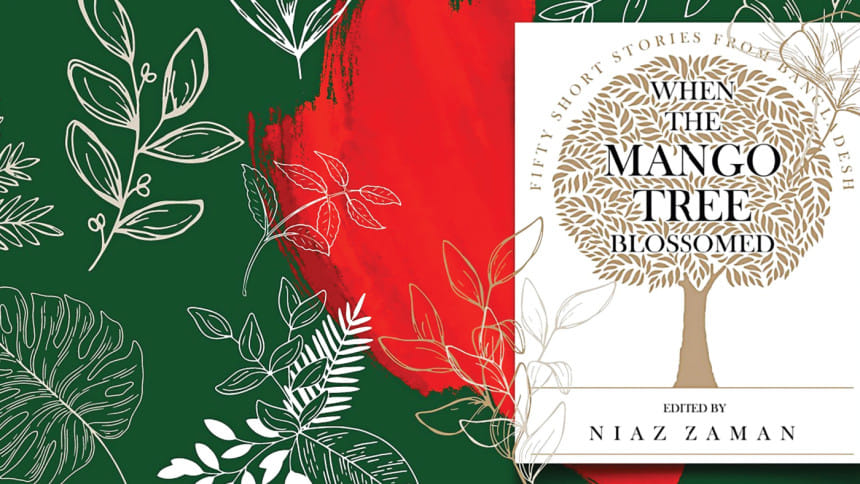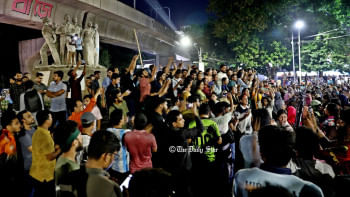HEFTY AT FIFTY: ‘When the Mango Tree Blossomed’ and other short stories from Bangladesh

The centenary of the Father of the Nation, and following on its heels the golden jubilee of the country's independence, have precipitated a tireless round of celebratory events and an avalanche of varied publications. Students of literature will be particularly interested in the literary stocktaking evinced by the appearance of anthologies. Three are already three on the market—Shazia Omar's Golden: Bangladesh at Fifty (UPL) presents a mix of original prose fiction and poetry in English by 23 contributors; Sohana Manzoor's Our Many Longings (Dhauli Books, Odisha) presents 19 pieces of "contemporary short fiction from Bangladesh"; antedating them by a few months, and also surpassing them in weight and volume, is the one under review.
Niaz Zaman is not only a prolific writer, scholar and translator, but also a tireless promoter of literary activity. She runs the Readers' Circle, which regularly meets to discuss a chosen title; encouragingly guides those who want to write or translate; and publishes literary works under her Writers Ink imprint. She has edited numerous anthologies of which this is probably the heftiest, fittingly with a story for each year of the country's existence. Like Sohana Manzoor she has included both original English stories (17) and translations from Bangla (33), but with greater attention to thematic structure.
A textbook introduction that will greatly benefit younger readers and foreigners sums up the country's political and cultural struggle, starting with the language movement and culminating in the independence war, before an outline of the thematic division of the stories into six groups; we can safely rechristen them as the political; the rural; the diasporic; the urban; the personal; and the broadly human. One can appreciate the logic behind this, but also wishes that the simple rule of starting with something that will draw the reader had been followed.
Instead, the opening story in its short opening paragraph has such a limp sentence as this:
"A huge scream was wailing from inside of him but he was afraid even to let it out."
And on the next page:
"Abir decided long ago to traverse the fields of arts and humanities and is recently said to have found his calling in creative writing."
A reader might well be utterly put off and not bother to move on to the second, eminently more readable and cleverly constructed story by Syed Manzoorul Islam. The sad fact is that the number of stories may represent the country's age but not (only) the best of our short fiction. Anyone familiar with our literary scene is also likely to be puzzled by the absence of some of the justly celebrated writers: Akhteruzzaman Elias, Mahmudul Huq, Shawkat Ali, Abdul Mannan Syed, to name a few who immediately come to mind.
Evidently, no attempt has been made to include the best available translation of a story, either; the reader is invited to compare the translation of Hasan Azizul Huq's "Shokun" here with the one by Iffat Nawaz in his Three Stories (Bengal Lights).
If I seem unduly harsh, let me hasten to add that there are enough commendable stories to make browsing the book's 744 pages worthwhile. Their topicality is noteworthy. Niaz Zaman's story "The Monster's Mother" is a painful reminder of the psychological havoc wrought by a terrorist on his kinsfolk. She has also turned eight stories into English with characteristic competence. Others who have translated more than one story are Sagar Chawdhury and Junaidul Huq (three each), and Noora Bahar and Marzia Rahman (two each). Clearly they take translation seriously and should be encouraged.
Fayeza Hasanat, herself an accomplished story writer, has translated an engaging piece by Mozaffor Hossain. Arifa Ghani, who has engaged with Sumon Rahman, is another serious translator. Besides those already mentioned, a number of well-known names will automatically draw the reader's attention. Here are a few randomly chosen examples. Syed Mujtaba Ali's "Sweet and Savoury" would have benefitted from more careful editing, but does succeed in sketching a moving portrait of Sylheti sailors and the extraordinary life of one who is forced to jump ship and start life anew with a Frenchwoman. Syed Waliullah, here in his Anglophone mode, is represented by "No Enemy", a haunting narrative that takes us into the troubled inner world of a dying man desperate to square his moral account by seeking forgiveness of all he had wronged. Death amidst high-tech healthcare presents an existential dilemma in Shahaduz Zaman's "My Position on Death is Very Clear", well translated by Sharmillie Rahman.
The placing of original English works cheek by jowl with translated ones demonstrates the commonality of literary culture that unites all writers of Bangladeshi origin. Roughly two-thirds of the Anglophone writers here, and two or three of the writers in Bangla are expatriates. Transnationality is bound to become more conspicuous as days go by, and it is only a matter of time before we have writers of Bangladeshi origin producing literature in European languages other than English.
While anthologies like the one reviewed here help us make a reckoning of what has been done so far, some may find it more interesting to monitor the changes in our literary culture that are bound to show up as the country marches towards its centenary.
Kaiser Haq is a poet, translator, essayist, critic, and academic. He is currently Professor of English at the University of Liberal Arts, Bangladesh (ULAB).

 For all latest news, follow The Daily Star's Google News channel.
For all latest news, follow The Daily Star's Google News channel. 



Comments